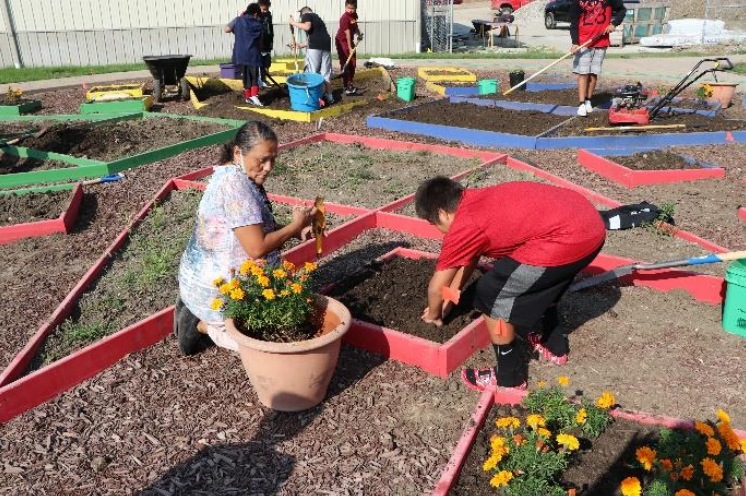Dan Moser, June 10, 2021
University works with Native Americans to improve nutrition, fight disease
An effort to tackle health challenges and improve nutrition among Native Americans, who suffer disproportionately from a variety of diseases, encompasses several University of Nebraska–Lincoln research and extension initiatives across the country that range from training future health care workers to promoting production of traditional tribal crops.
The goal of these efforts is to reduce or eliminate health disparities in Nebraska and beyond. To achieve this goal, researchers and extension educators work directly with the communities they serve and incorporate important cultural elements into programs that encourage health and wellness.
For example, Nebraska is one of 17 land-grant university partners in the Well Connected Communities initiative, which reaches 40 communities across the country, including Macy and Lincoln. Another initiative is the Community Based Participatory Research program supported by the National Institutes of Health’s National Institute on Minority Health and Health Disparities. Nebraska’s project aims to adapt cardiovascular disease risk reduction efforts in Native populations.
Lisa Franzen-Castle, associate professor and extension nutrition specialist in the nutrition and health sciences department, said the WCC initiative is focused on two communities — Macy and Lincoln — through cross-sector coalition development and a Master Health Volunteer Program. Funded by the National 4-H Council, in partnership with the Robert Wood Johnson Foundation, the initiative helps build diverse, multigenerational coalitions and provides at least 40 hours of training for adult and youth volunteers from a national curriculum and Nebraska Extension faculty. Adults and teens are trained about health, particularly social determinants of health, healthy food access and basic nutrition. Additionally, the program delivery offers youth a chance to share their voice and determine a plan for volunteering and connecting. Teens also learn about their strengths and talents and how to use them to impact their community.
Initiatives to target Native Americans living in urban areas — primarily Lincoln and Omaha — also are underway through the Community Based Participatory Research program. About 65% of the state’s 16,100 Native Americans live in cities.
Native American populations are beset more than other populations by cardiovascular disease, diabetes, obesity, hypertension and other life-threatening diseases. Franzen-Castle said the goal is to develop culturally tailored interventions by partnering with community leaders.
“One of the things I really appreciate about this … it puts communities in the driver’s seat,” Franzen-Castle said. “Each community is different.”
Nebraska Extension faculty help communities set priorities, choose programs and policies, and activate their plans, she added.
Prior efforts to intervene compromised health and trusted relationships with Native Americans, said Jean Ann Fischer, associate extension educator and Human Sciences Program leader involved with the efforts. These efforts are based on strategies that connect with Native culture and traditions to move toward holistic well-being to address disease.
“We’re trying to show we’re a partner,” Fischer said. “We want them to have that voice.”
Among the goals, she added, is to encourage Native youth to consider careers in health care.
Ted Hibbeler, an associate extension educator focused on tribal education and engagement based in Thurston County, is involved in several university-tribal partnerships. He’s especially keen on encouraging Native Americans to grow and eat traditional foods that are healthier and more natural than their modern diets, which often are heavy on processed and fast foods.
For example, the Umonhon Nation Public School in Macy is creating a K-12 food sustainability program that uses a greenhouse and farm-to-school program to support accessibility and distribution of traditional healthy edible and medicinal plants to the Omaha Tribe. “One of our goals is to create community local food producers within the Omaha Tribe,” said Hibbeler, a Lakota tribe member.
It’s a matter of both food security and Native employment, he added.
“We were a very healthy people before Europeans came here,” Hibbeler said. “We’re trying to get back to that: growing our traditional crops, using our traditional practices, eating healthy again.
“We called it the three sisters – corn, beans and squash. … People can identify with that; they remember their grandparents having those gardens.”
The University of Nebraska–Lincoln’s Native American Coalition helps oversee the university’s multi-pronged initiatives and partnerships between Nebraska Extension and Native American communities.






